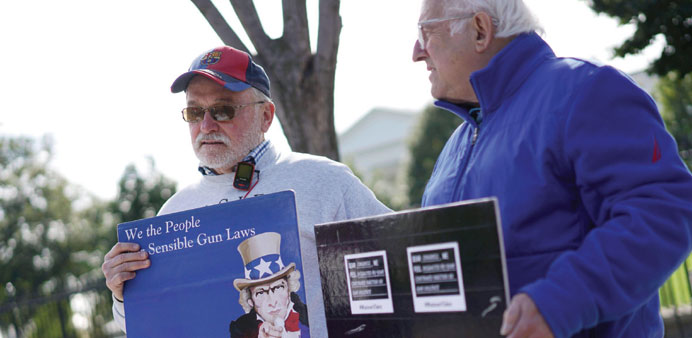Reuters/Roseburg, Oregon
When a gunman killed eight students and a teacher at an Oregon college last week, he also revived a debate on the need to change firearm laws and whether the school’s “gun-free zone” policy only made easier for him.
President Barack Obama quickly pleaded for stricter gun laws to prevent similar tragedies, angering conservatives such as Republican presidential hopeful Mike Huckabee. “It’s clear that gun-free zones are sitting-duck zones,” Huckabee said.
But about a dozen students and others connected to Umpqua Community College in Roseburg said many students carried guns despite the campus ban and that this was common knowledge.
“You are allowed to conceal and carry on that campus,” said Umpqua student and part-time wildland firefighter Jeremy Smith, 24. “It’s not a gun-free zone.”
Smith said he would never return to campus without a handgun.
“I’m an avid gun owner,” he said. “I carry, like just about anybody else does.”
Although Oregon state law allows concealed weapons, Umpqua’s student handbook says firearms are prohibited on college property “except as expressly authorised by law or college regulations.”
The school includes firearms training in its criminal justice programme for people accepted into a Police Reserve Academy. Students use the Roseburg Rod and Gun Club, a short drive from campus, to shoot or get help registering for a concealed-carry permit, an employee there said.
While there were two unarmed security guards at the sprawling campus, several current and former students said legally carrying concealed handguns was not unusual, particularly among the hundreds of military veterans who attend classes and frequent the Student Veterans Center.
The question of who had a gun to defend a classroom instantly struck one teacher when gunshots rang out on campus on Thursday.
“When I got into the room that was locked down, one of the professors asked if anyone was concealed carry,” said student John Parker, an Air Force veteran, who had a gun on his hip.
“I raised my hand and said: ‘Don’t worry, nobody is coming through that door.’”
Beyond the veterans’ community, however, other students said they were convinced the campus was in fact gun-free, citing the school’s code of conduct and the broader culture among the roughly 3,000 full-time students.
While Oregon leans liberal, guns are woven into the cultural fabric of Roseburg’s Douglas County, where a large population of hunters, sport shooters, and military veterans are backed by Sheriff John Hanlin, a staunch Second Amendment rights proponent.
About one in 16 Oregon adults have concealed-carry permits, local media reported. Roseburg Mayor Larry Rich said he was getting such a permit and frequently visited the pistol range near campus.
Former Umpqua Community College President Joe Olson told US media that a sharply divided campus in recent years had rejected plans for armed security officers. Current college officials did not respond to requests for comment.
“In the past,” said local pastor Ted Johnson, “you could drive on campus at the high school or at UCC, and it would not be uncommon to see pickups (trucks) all over the parking lot with gun racks and guns in the back window.”
Jared Norman said he knew several fellow Umpqua students who brought guns to campus but usually left them in their cars. He also planned to take a gun safety course and obtain a conceal to carry permit in the wake of the shooting
“It does not surprise me that students carry on campus,” he said. “Honestly, knowing that there are responsible gun owners on campus made me feel safer that day.”
An Oregon appeals court ruled in 2011 that universities could not prevent gun owners with concealed weapons permits from bringing their firearms to campus.
The Oregon legislature, the only body with the authority to regulate firearms, has proposed bills over the past several years seeking to clarify guns-in-school laws, but none passed. One proposal would have banned all guns on school grounds.
Oregon law prohibits firearms in public buildings except for a person with a concealed carry licence, said Kristina Edmunson, a spokeswoman for the state attorney general. However, community college and university boards have broad authority to enact policies, she added.
This ambiguity has fueled a debate over the extent of control colleges have in setting their own policies and whether more law-abiding gun-carriers could subdue future killers and save lives.
“I would have loved to see more students with the ability to turn around and send this (killer) back to the great beyond,” said Kevin Starrett, director of the Oregon Firearms Federation gun rights group.

